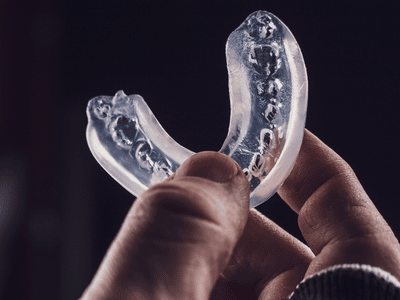
In This Post, We’ll Cover:
- Why should you wear a mouthguard?
- Do Braces put you at a risk for a sports injury?
- What types of mouthguards can I buy?
Why Should You Wear a Mouthguard?
There are many good reasons to wear a mouthguard, especially if you play contact sports. Mouthguards can help to protect your teeth from being damaged or knocked out. They can also help to reduce the risk of concussions by absorbing some of the impact from a blow to the head. And, in some cases, they can even help to prevent jaw injuries. Anyone participating in a sport should wear a mouthguard to protect their teeth. The American Dental Association estimates the risk of serious sports injury to the mouth is almost doubled when you don’t wear a mouthguard (www.ada.org).
Do Braces Put You at a Risk for a Sports Injury?
Though braces themselves don’t increase the risk of a dental injury during sports, they are something that must be accounted for when playing. Wearing a mouthguard is even more imperative when one is in orthodontic treatment. Braces and wires can lacerate the mouth if you receive a ball to the face. Even worse, your teeth could be cracked, chipped, or even knocked loose. While braces help make sure a tooth isn’t knocked loose in a severe collision, a hit to the mouth is a bit more painful with all that metal. Wearing a mouthguard with braces is essential!
What Types of Mouthguards Can I Buy?
There are a few different types of mouthguards to choose from. Some are made from soft, flexible materials that can be molded to fit your mouth. Others are made from harder materials that offer more protection. You can even get mouthguards that have straps or other attachments to help keep them in place.
Over-the-Counter Mouthguards:
These mouthguards are more affordable and can be purchased at a local sports or drug store. They are fitted using boiling water which warms the plastic of the mouthguard, and then biting into the warm mouthguard so that the plastic can mold to the shape of your teeth. In general, these mouthguards will cost you anywhere from $15 to $35. They are easy and affordable, but are also not as effective and aren’t the most durable option.
Custom Mouthguards:
These mouthguards are custom created by a dental professional from thermoplastics. They are based on a detailed mold taken from your mouth. This type of mouthguard is highly personalized and can have modifications based on what your mouth needs. They are fitted by your dentist by taking an impression of your teeth and then sending the impression to a lab where the mouthguard is created. In general, these mouthguards can cost anywhere from $100 to $700. These mouthguards, while more expensive and needing a dentist visit, and the best, most durable protection available.
No matter what type of mouthguard you choose, be sure to clean it regularly and replace it when it starts to show signs of wear. With proper care, a mouthguard can last for several years. And, in the long run, it can definitely be worth the investment.